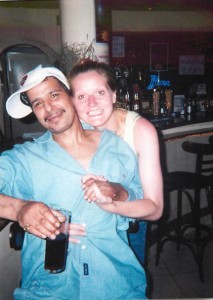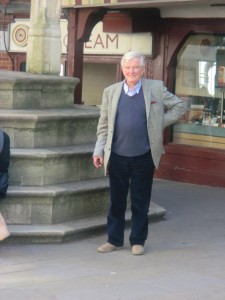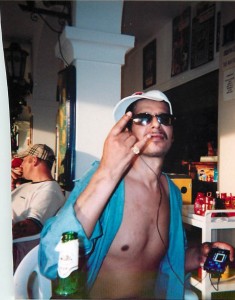By Satish Sekar © Satish Sekar (March 22nd 2011)
Real Friends
Yusef Abdullahi is the first of the Cardiff Three to die. His recent death has re-opened the debate on the provision of after-care to victims of miscarriages of justice. Abdullahi was just 49 and died without having received any assistance to rebuild his life from the Miscarriages of Justice Support Service (MJSS).
“The state has a duty to restore him to the life that he would have had if the miscarriage of justice had not happened”, said Abdullahi’s QC and champion Roger Backhouse. “He could have gone to university. He was that intelligent. Yusef is the only person that I would do this for”.
Backhouse used his own resources to try to help Abdullahi. Despite his own failing health Backhouse came and saw Abdullahi, arranged medical assistance for him, helped him fill in social security forms and much more besides. He even contributed to an as yet unbroadcast documentary on the subject.
There were others too. Despite being the victim of one of Wales’ most notorious miscarriages of justice and needing help himself Michael O’Brien helped Abdullahi too. “I will never forget that Yusef campaigned for me at a time when few others did”, he said. “I wanted to help him and think it outrageous that he never received help. I took it up with the Miscarriages of Justice Project [MJP] before”. It is now called the Miscarriages of Justice Support Service.
Salvation and Curse
O’Brien welcomed Abdullahi into his home and advised him on some pitfalls and offered help. Winston Silcott rarely gets any credit, but he played a pivotal role in helping Abdullahi both inside and outside of prison. Abdullahi tried to credit him, as Silcott’s assistance gave Abdullahi a purpose to help him cope in prison. Silcott inspired him again when Abdullahi most needed it to get his life back on track outside.
Abdullahi came out of prison in 1992 in a blaze of publicity and embarked on a punishing schedule to highlight the plight of other victims of miscarriages of justice. Within a year he was thoroughly exhausted. It had been both his salvation and curse. Campaigning for others gave him a sense of purpose again and deprived him of time to focus on his problems – they could wait – but the schedule wore him out and down. He needed a break – he’d earned it – but it came at a very high price.
Deprived of the benefit of his cause he sank into the problems that others in his situation had faced before and since. I’d fallen out of touch with him – I had other things on my mind. The outlook for him was bleak and steadily got worse. He turned back to alcohol and drugs and as his demons took over, he slid into depression and an ever downward spiral. So-called friends did little or nothing to help. He was horribly let down, but his story is sadly too common.
Fateful Meeting
It had been the best part of ten years since I’d seen him last. The phone calls and visits had dried up from both of us. He didn’t call me and I didn’t call him. We both had other things going on. The same applied to many others. I still heard about him occasionally if not from him and I didn’t like what I was hearing, but it was his life and he had to be ready to change it, or so I thought then. I was wrong. He needed help desperately, but offering it was not enough.
When I saw him again for the first time in ten years I was shocked. The confident affable young man I’d known and remembered was gone – replaced by a man who looked at least ten years older than he was. He had been worn down by life’s outrages. He turned up to a court hearing in which Jeffrey Gafoor, the man who committed the crime that wrecked Abdullahi’s life, was sent to jail, not having finished his breakfast – a can of Tenants.
I’d seen enough. Something had to be done. Someone had to intervene. If they didn’t he was on borrowed time and not much of it. I approached the MJP and professionals and representatives too, outlining my concern that if he wasn’t helped soon he would not survive long.
We developed a package of after-care just for him. Society had wronged him and others like him. Now it could put it right by helping to rebuild his life. It wasn’t ideal as he had specific care needs, but the MJP was there to help. It had been set up that very year precisely to help victims of miscarriages of justice. Surely it would intervene. It simply had to.
A Shameful Betrayal
Abdullahi had issues requiring medical intervention. He needed help to conquer his addictions, but that required medical permission. All it needed was an approach to his doctor to recommend the course of treatment and help required, but not just for him. There was no point helping him give up hard and addictive drugs if he was going to be sent back into the same circumstances that he found so intolerable that he needed heroin to block out his woes in the first place.
With others using around him it was inevitable that he would relapse – it was when, not if. Miraculously a solution was found. They would all be helped at the same time. All it required was his doctor’s recommendation, but who could get through to him? Why should he trust the so-called friends who hadn’t been there for ten years when he needed it – and yes I’m as responsible as the rest over this.
I approached the MJP. I stressed the urgency of the situation – it was the summer of 2003. They were asked to go and see them and develop a plan to help. Even the limited service that they offered was enough to get things started. They agreed to go to Cardiff to see him and Tony Paris. It should have been the start of the rest of his life. Instead he was let down.
The then Deputy Director of the MJP, Amarjit Kaur, reneged on the agreement to go and see them. She claimed that it would affect their funding and mean that they could not help other victims of miscarriages of justice.
Nearly eight years later Abdullahi is dead and the disgraceful situation that denied him help has not been resolved. The MJSS was set up to provide assistance to victims of miscarriages of justice rebuild their lives, so why was Abdullahi left out when he badly needed help?






